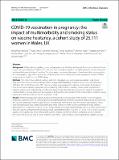Files in this item
COVID-19 vaccination in pregnancy : the impact of multimorbidity and smoking status on vaccine hesitancy, a cohort study of 25,111 women in Wales, uk
Item metadata
| dc.contributor.author | Mhereeg, Mohamed | |
| dc.contributor.author | Jones, Hope | |
| dc.contributor.author | Kennedy, Jonathan | |
| dc.contributor.author | Seaborne, Mike | |
| dc.contributor.author | Parker, Michael | |
| dc.contributor.author | Kennedy, Natasha | |
| dc.contributor.author | Akbari, Ashley | |
| dc.contributor.author | Zuccolo, Luisa | |
| dc.contributor.author | Azcoaga-Lorenzo, Amaya | |
| dc.contributor.author | Davies, Alisha | |
| dc.contributor.author | Nirantharakumar, Krishnarajah | |
| dc.contributor.author | Brophy, Sinead | |
| dc.date.accessioned | 2023-09-14T09:30:02Z | |
| dc.date.available | 2023-09-14T09:30:02Z | |
| dc.date.issued | 2023-09-11 | |
| dc.identifier | 293209536 | |
| dc.identifier | f27a8515-ccbf-4df4-a8ff-05dc5cfabbc0 | |
| dc.identifier | 85170388038 | |
| dc.identifier.citation | Mhereeg , M , Jones , H , Kennedy , J , Seaborne , M , Parker , M , Kennedy , N , Akbari , A , Zuccolo , L , Azcoaga-Lorenzo , A , Davies , A , Nirantharakumar , K & Brophy , S 2023 , ' COVID-19 vaccination in pregnancy : the impact of multimorbidity and smoking status on vaccine hesitancy, a cohort study of 25,111 women in Wales, uk ' , BMC Infectious Diseases , vol. 23 , 594 . https://doi.org/10.1186/s12879-023-08555-8 | en |
| dc.identifier.issn | 1471-2334 | |
| dc.identifier.other | ORCID: /0000-0003-3307-878X/work/142499526 | |
| dc.identifier.uri | https://hdl.handle.net/10023/28372 | |
| dc.description | Funding: This work was funded by the National Core Studies, an initiative funded by UKRI, NIHR and the Health and Safety Executive. The COVID-19 Longitudinal Health and Wellbeing National Core Study was funded by the Medical Research Council (MC_PC_20030). SVK acknowledges funding from a NRS Senior Clinical Fellowship (SCAF/15/02), the Medical Research Council (MC_UU_00022/2) and the Scottish Government Chief Scientist Office (SPHSU17). | en |
| dc.description.abstract | Background Multimorbidity, smoking status, and pregnancy are identified as three risk factors associated with more severe outcomes following a SARS-CoV-2 infection, thus vaccination uptake is crucial for pregnant women living with multimorbidity and a history of smoking. This study aimed to examine the impact of multimorbidity, smoking status, and demographics (age, ethnic group, area of deprivation) on vaccine hesitancy among pregnant women in Wales using electronic health records (EHR) linkage. Methods This cohort study utilised routinely collected, individual-level, anonymised population-scale linked data within the Secure Anonymised Information Linkage (SAIL) Databank. Pregnant women were identified from 13th April 2021 to 31st December 2021. Survival analysis was employed to examine and compare the length of time to vaccination uptake in pregnancy by considering multimorbidity, smoking status, as well as depression, diabetes, asthma, and cardiovascular conditions independently. The study also assessed the variation in uptake by multimorbidity, smoking status, and demographics, both jointly and separately for the independent conditions, using hazard ratios (HR) derived from the Cox regression model. Results Within the population cohort, 8,203 (32.7%) received at least one dose of the COVID-19 vaccine during pregnancy, with 8,572 (34.1%) remaining unvaccinated throughout the follow-up period, and 8,336 (33.2%) receiving the vaccine postpartum. Women aged 30 years or older were more likely to have the vaccine in pregnancy. Those who had depression were slightly but significantly more likely to have the vaccine compared to those without depression (HR = 1.08, 95% CI 1.03 to 1.14, p = 0.002). Women living with multimorbidity were 1.12 times more likely to have the vaccine compared to those living without multimorbidity (HR = 1.12, 95% CI 1.04 to 1.19, p = 0.001). Vaccine uptakes were significantly lower among both current smokers and former smokers compared to never smokers (HR = 0.87, 95% CI 0.81 to 0.94, p < 0.001 and HR = 0.92, 95% CI 0.85 to 0.98, p = 0.015 respectively). Uptake was also lower among those living in the most deprived areas compared to those living in the most affluent areas (HR = 0.89, 95% CI 0.83 to 0.96, p = 0.002). Conclusion Younger women, living without multimorbidity, current and former smokers, and those living in the more deprived areas are less likely to have the vaccine, thus, a targeted approach to vaccinations may be required for these groups. Pregnant individuals living with multimorbidity exhibit a slight but statistically significant reduction in vaccine hesitancy towards COVID-19 during pregnancy. | |
| dc.format.extent | 9 | |
| dc.format.extent | 1070773 | |
| dc.language.iso | eng | |
| dc.relation.ispartof | BMC Infectious Diseases | en |
| dc.subject | COVID-19 vaccination | en |
| dc.subject | Pregnancy | en |
| dc.subject | Multimorbidity | en |
| dc.subject | Smoking status | en |
| dc.subject | Vaccine uptake | en |
| dc.subject | Vaccine hesitancy | en |
| dc.subject | SAIL databank | en |
| dc.subject | RA0421 Public health. Hygiene. Preventive Medicine | en |
| dc.subject | E-DAS | en |
| dc.subject | SDG 3 - Good Health and Well-being | en |
| dc.subject | MCC | en |
| dc.subject.lcc | RA0421 | en |
| dc.title | COVID-19 vaccination in pregnancy : the impact of multimorbidity and smoking status on vaccine hesitancy, a cohort study of 25,111 women in Wales, uk | en |
| dc.type | Journal article | en |
| dc.contributor.institution | University of St Andrews. School of Medicine | en |
| dc.identifier.doi | 10.1186/s12879-023-08555-8 | |
| dc.description.status | Peer reviewed | en |
This item appears in the following Collection(s)
Items in the St Andrews Research Repository are protected by copyright, with all rights reserved, unless otherwise indicated.

